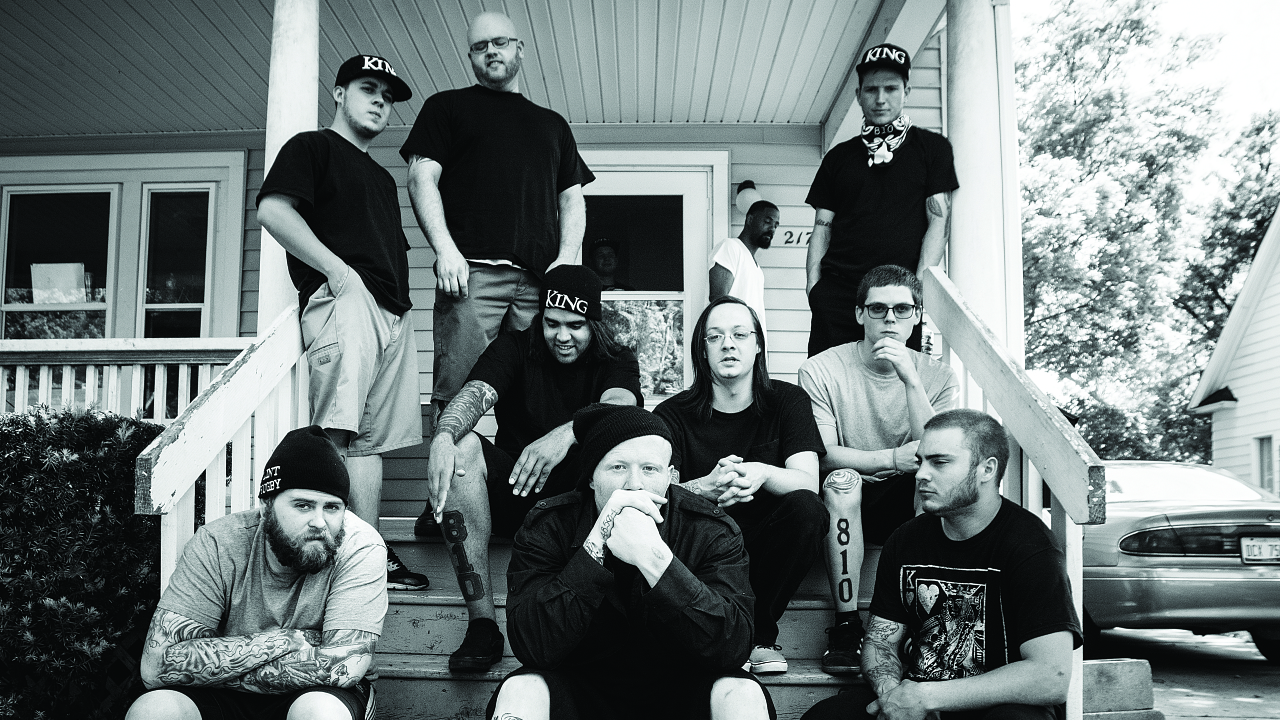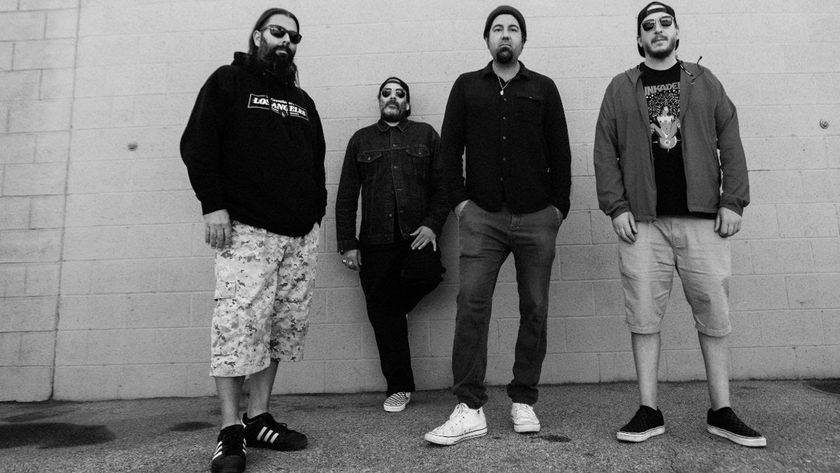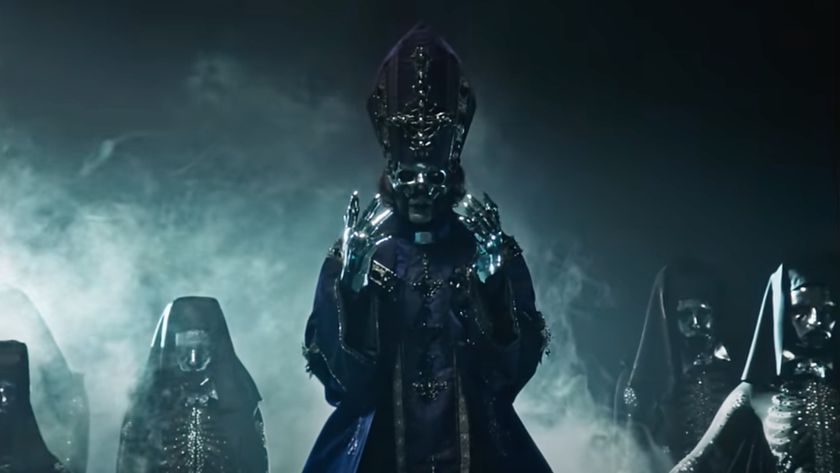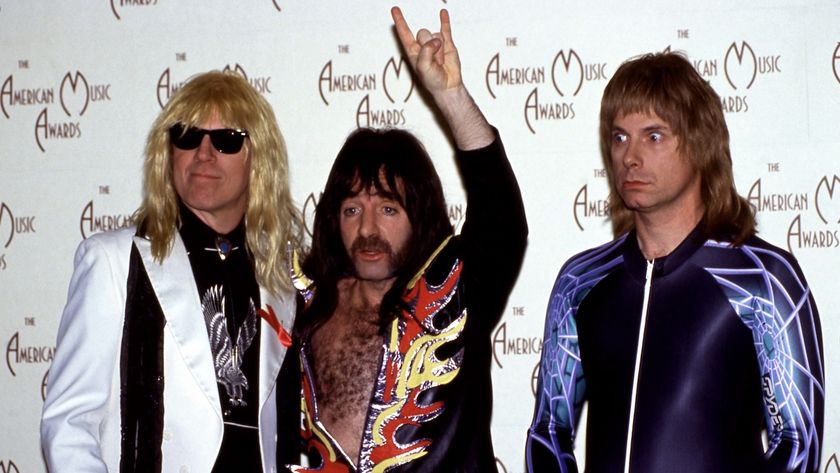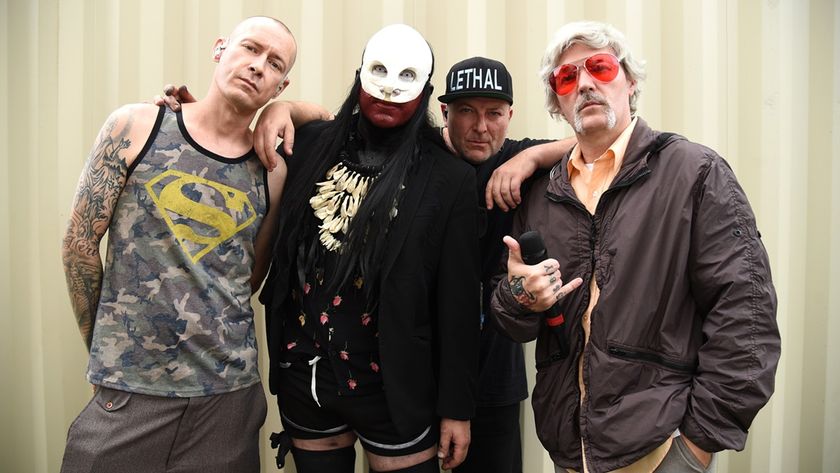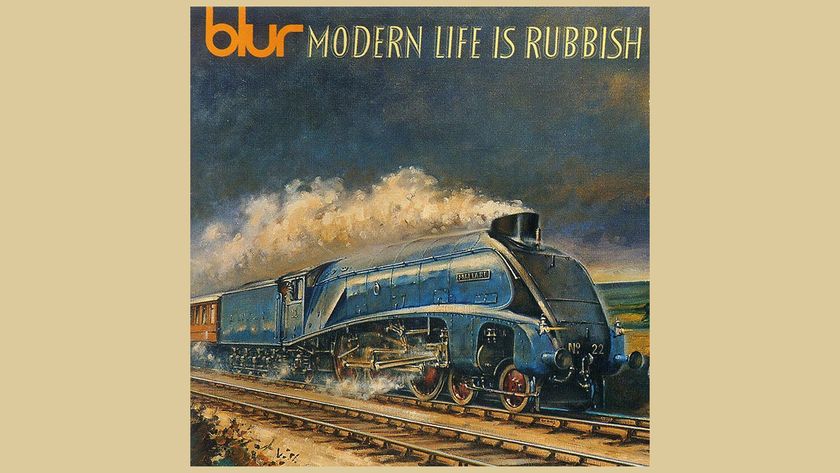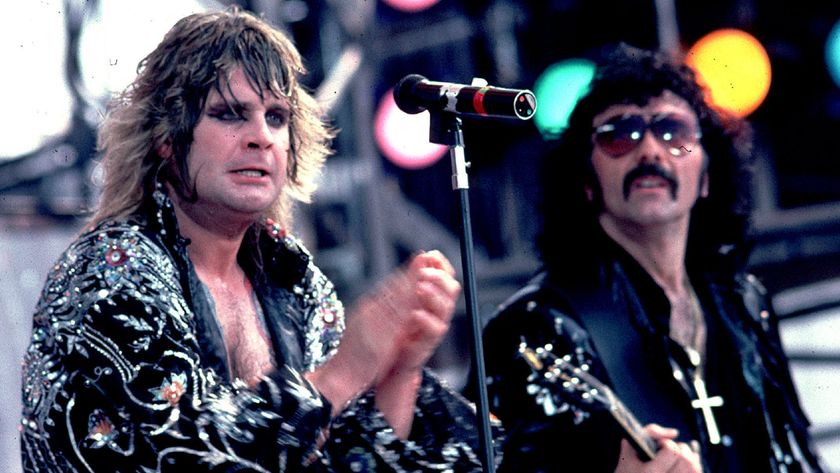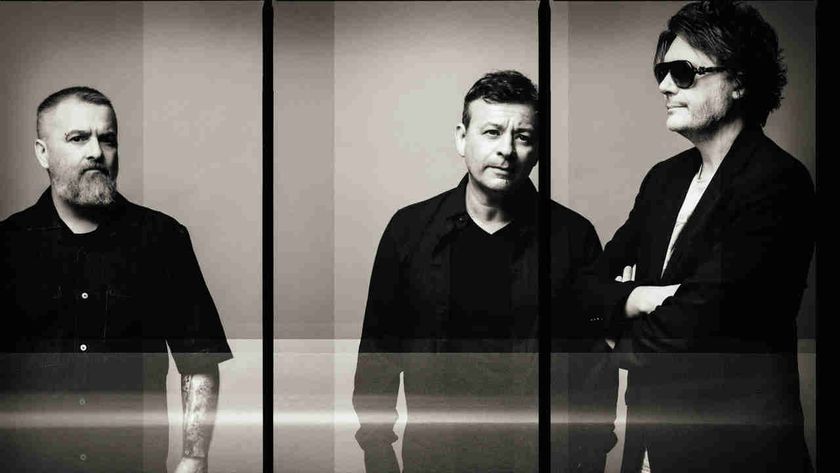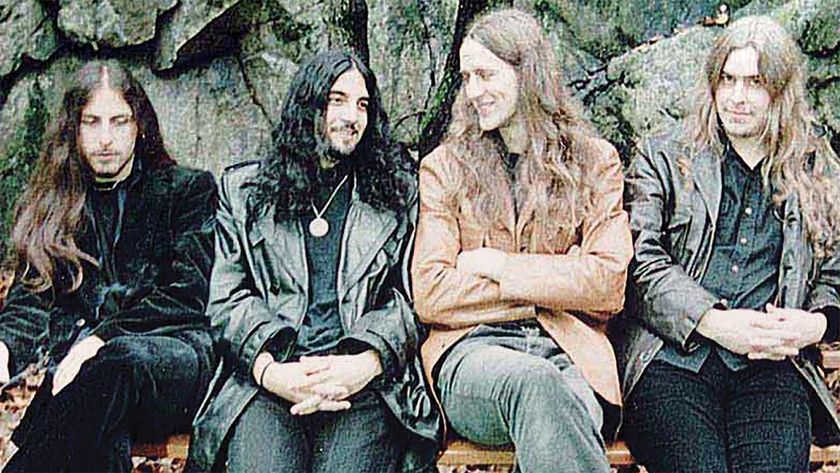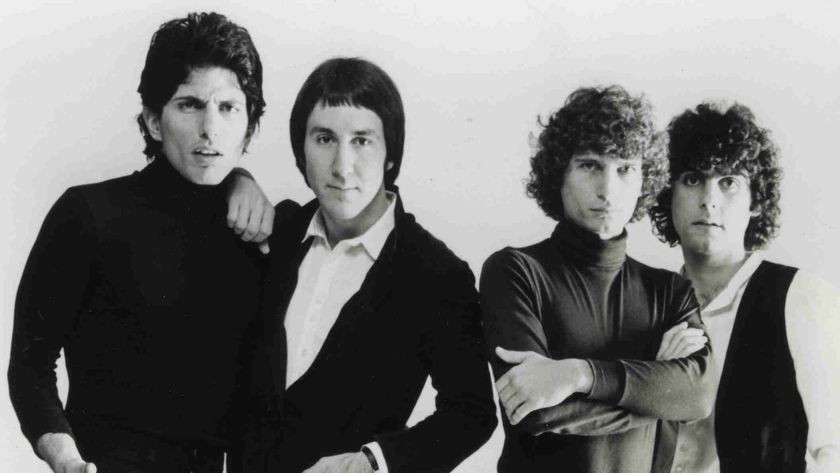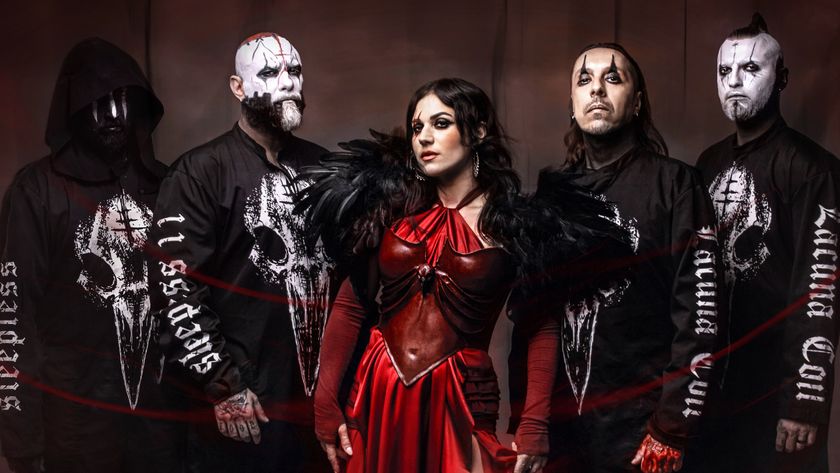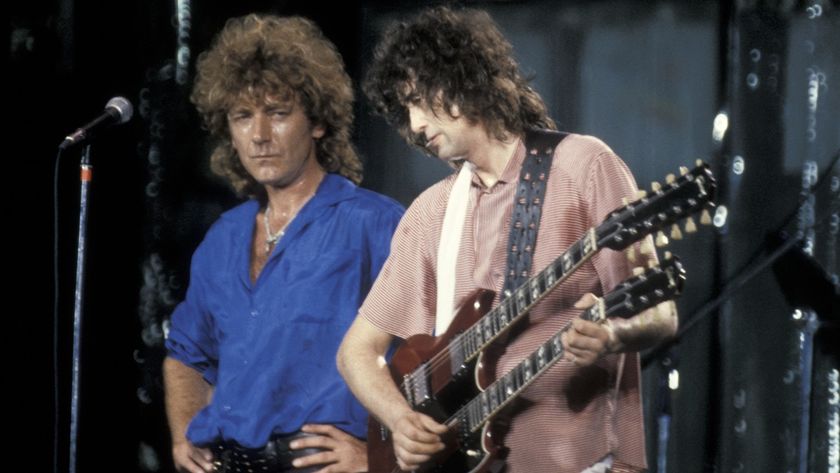At the time of going to press, we still don’t know what will become of King 810. Frontman David Gunn was acquitted of the assault charges that prevented them from making their UK debut at Download festival, while bassist Gene Gill’s case was bound to a different court. For now, at least, this is their story…
“Anything can happen at any time. Right now, a car could drive up and someone could shoot us both. But until then, we’re just gonna try to achieve all the things that we want to. We definitely lived fast and we should’ve died young, but it turns out we didn’t for some fucked-up reason. Maybe this is more important than just being buried…”
Welcome to Flint, Michigan, USA. It’s a small city, 66 miles northwest of Detroit, that would otherwise be thoroughly unremarkable were it not for the fact that it is widely acknowledged as the most dangerous place in the whole of the United States. For much of the 20th century Flint was thriving, largely due to the then-booming car industry which provided a huge number of the city’s residents with secure employment. According to reports, General Motors employed 80,000 people in the area in 1978. But only a few years later, the company began to move its operations to Mexico for economic reasons. Unemployment in Flint soared and, as is inevitable, so did crime. Today, as we drive through the city’s now largely derelict and decaying suburbs en route to meet King 810, the most exciting and controversial metal band to emerge from America in more than a decade, Flint feels like a city that the rest of American society has turned its back on and forgotten. The air hangs heavy with an unnerving, eerie calm and, even without reading the frankly terrifying crime statistics that now form the only credible view of this once vibrant place, it’s fairly obvious that that calm is illusory; a tense state of stasis that necessarily and unavoidably precedes a storm. This is Flint. Murder City USA. And this is the place that King 810 call home.
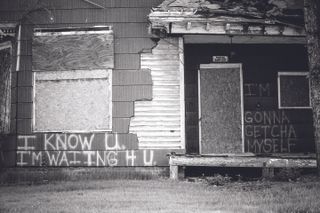
Observant metal fans will already have heard and read about this band. Their reputation goes before them like a whispered threat. Their live shows are already notorious for being extremely intense and violent affairs; the band’s obsessively dedicated local following contributing to a sense of on-the-edge chaos just as much as the band and their raging, incensed music. The core of the band formed a decade ago, led by frontman, lyricist and visionary – the latter, a label that is for once utterly appropriate – David Gunn. Since then, King 810 have steadily become renowned for both standing apart from everything else that is going on in American metal right now and for writing songs that dig deep into the crippled black heart of a city in ruins. The titles say it all: Killem All, Murder Murder Murder, War Outside… either King 810 are cynically exploiting their hometown’s fearsome reputation or, as we soon discover to be the truth, they are simply reporting from the frontlines of a sincerely fucking terrifying place that has forced them to live a life that no sane person would envy. You want your music to be real? Well, this is as real as it gets.

“When you’re a kid, you’re happy and you play. We played. But it’s a little bit different here…”
It seems safe to say that we have never met anyone quite like David Gunn. In an age where most people in metal bands have nothing significant to say and only a handful of well-worn ways to convey that nothing, he instantly stands out. In fact, he would stand out pretty much anywhere. Six feet tall and built like a brick shithouse, dressed head to toe in black and exuding a formidable but nebulous presence, he may look superficially like any burly 28-year-old American. But his eyes tell a different story. He has the eyes of an old man; an old man who has seen too much, experienced too many horrifying things and stared death in the face. Friendly, articulate and thoughtful, he takes us on a drive around the area where King 810 and their extended crew of up to 40 comrades – call them a gang if you will, but the usual connotations that come with that description seem somehow not applicable here – spend their days. The streets are almost entirely empty, with just a few clusters of people dotted around at points along the way, all of whom stop what they’re doing and stare intently (and a little menacingly) at our car as we pass slowly by. It feels like people are watching, waiting, anticipating, expecting something to happen. And not something good.
“When I was a kid, sometimes you’d find people laying in the road,” David states, with a shrug of his huge shoulders. “Sometimes you’d see that go down and then you’re not a kid anymore after that. One time there was a guy… I thought he was asleep. He was on the side of the road, laying face down. He was dead. After a couple dozen of those… well, you just process it quicker. It’s not easier, but you can’t get hung up on it because it’s gonna happen again tomorrow. It happens often, and that’s why it happens often in our music. People say we endorse violence and guns, but actually it’s downplayed in the music. In reality, there would be nothing but that, in all the songs.”
David keeps driving. We pass another nondescript side road, lined with burnt-out houses, piles of garbage and abandoned cars.
“I got shot right there once, last year on that street,” he says, matter-of-factly. “Some people I don’t like shot me. It happens.”
Then we turn down another street. Like every other street, it looks like it might have once been a fairly pleasant, leafy and suburban locale, where people could raise a family and have a decent life.
“That’s where I grew up,” he says, pointing to another ramshackle and neglected house. “You can live there for 50 bucks a week now. It’s a steal! But no one wants to live there.”
He laughs, briefly. And we drive on.
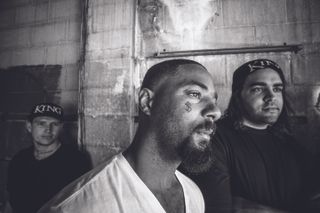
Eventually, we pull up outside a slightly less knackered-looking detached house. This is one of apparently several locations where King 810 and their crew hang out. There are 12 or so members of the crew sitting outside the house, along with the other three members of the band, bassist Gene, drummer Twerk and guitarist Karl, their King 810 tattoos – mostly on shins – proudly displayed. Nearly all of them are wearing the band’s stark black and white snapback logo caps. Some of them are clearly a lot younger than David but all of them have a faintly intense and wary look in their eyes. They greet us as warmly as we can reasonably expect, but there is a definite sense that the bizarre notion of journalists and photographers from a UK metal magazine rolling up on their doorstep is a little out of the ordinary and, perhaps, rather uncomfortable for a group of people who spend most of their time sticking together to fend off unwanted attention from those who may wish to do them harm. Again, there is an eerie calm in the air.
“We aren’t some group that turns everyone away,” says David. “There’s reasons why we’re together, I guess. Being like this does draw a lot of attention and there are more negative things going on with it than positive. The only positive thing about it is what we get out of it. The beneficial things about it? We would be the only people who’d see that. We’re not bothering anybody, but it’s a big group of people and you have a big group of problems. The group takes on everyone’s problems, and that’s a downside to it. One person does one thing and the whole group gets a rap for it. I guess we take responsibility for it, and we keep moving.”
Chatting to various members of the band and their crew, it’s obvious that everyone is on the same page when it comes to King 810 and the stories that David is trying to tell through the songs on forthcoming debut album, Memoirs Of A Murderer. Flint is a deeply fucked-up place and life here is a long way from the relatively cosy existence that most of us in the developed world take for granted. We hear stories of an old Chinese lady who ran a “dollar store” along the main road that runs through the heart of Flint, and how she was bludgeoned to death with a hammer by two 13-year-olds so they could steal some sweets. We learn that virtually everyone here – and that includes the band themselves – carries a weapon for protection at all times, because to do otherwise would be foolhardy in the extreme. Should we feel the need to arm ourselves during our trip to Flint, we are told that it would take “less than two hours” of asking around to procure a gun. It is all indubitably shocking, particularly to those of us who grew up in smalltown England where guns are simply not a part of everyday life, but what is more shocking is how resigned King 810 and their friends are to this reality, to this life.
A natural spokesperson for the band, David has clearly been through more real-life horror than anyone else you’ll read about in this, or any other, magazine. He has been shot twice. He has also spent some time in prison, several years ago, for something concerning “drugs and guns”. When you hear Memoirs Of A Murderer for the first time, remember that this is not some jumped-up American kid trying to make a name for himself by acting the hard man and making up grim fairytales. This is an exercise in story-telling, for sure, but every word of every song comes from something that really happened. And with that in mind, it seems extraordinary that someone as self-evidently intelligent and sensitive as David has made it this far.
“I guess you do become desensitised but it makes you more aware of everything around you, too,” he states. “You understand things for what they really are and, to a degree, that you don’t always want to understand them. Ignorance is bliss. It’s different when something happens and you don’t get it, because you just don’t know what’s going on. When you fully understand it… that’s why I say some of the things on the record the way I say ’em – you might say, poetically. A lot of these things have happened to a bunch of people, but it’s the level of intellect [with which] you have to convey it that makes that expression different from the next guy. It’s probably a double-edged sword. It probably makes this situation more sad, because what we do is not just an ignorant layman’s feeling towards this place.”

These are early days for King 810, despite the long gestation period that the band have lived through. Recently signed to Roadrunner Records and snapped up by the same management company that oversee operations for Slipknot, David and his bandmates have reached this point without pursuing the usual, traditional route of relocating to a bigger city. Flint is their home and for all its obvious disadvantages, this is where they feel most comfortable. David even tells us that he would stay here regardless of how successful the band becomes because, as he puts it, “this is where we belong”. But it seems highly likely that once Memoirs Of A Murderer is fully unveiled, life is going to change significantly. An astonishingly complex, profound and inspired piece of work that exhibits a startling level of diversity and depth, taking in everything from the bludgeoning metal of Killem All and new single Fat Around The Heart to the elegiac street-folk of Take It and the orchestrally-augmented ballad Devil Don’t Cry – which is a dead ringer for Nick Cave & The Bad Seeds, a band that David has never listened to – it is quite unlike anything else you will hear this year. Suddenly, the hordes of identikit metalcore bands, all preaching the same empty gospel, seem even less substantial than before. Memoirs Of A Murderer is a work of art and David’s troubled but razor-sharp view of the world is its driving force.
“This record is about our lives,” he avows. “We don’t punch out and go home at the end of the day and take the mask off and go hang out at the bar. If we weren’t doing this, we’d just be out here anyway. I didn’t want to be anything when I was a kid. I was never gonna grow up and be anything. I didn’t want to go to school. I wasn’t gonna trade my time for money, working a job. I didn’t have any backup plan. We crossed a bridge and burnt it behind us. There was no other option or Plan B or college or any other shit. Everyone always said, ‘You need to go to Detroit, you need to go to Chicago, you need to go to California…’ but we sat right here, making as much noise as we could until someone noticed. And someone did.”
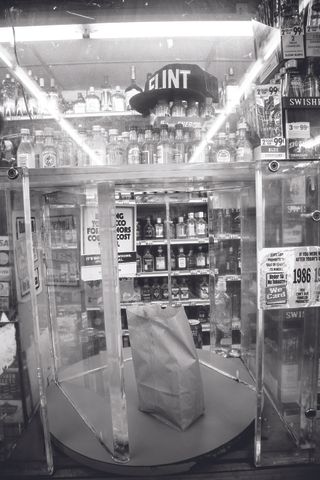
It’s hard not to wonder how it must feel to wait around for someone to notice what your band is doing, when the majority of your time is spent waiting around for something far less pleasant to happen. Equally, however, it’s easy to see how King 810 are doing everything they can to wring a few drops of positivity from their turbulent collective existence. Salvation through creativity, perhaps. Or simply an example of that old cliché about rock’n’roll being one of the few great escapes for people whose lives are heading down the wrong path.
“A lot of people who live through this shit just let it eat ‘em,” David nods. “A lot of people I know and have known, people that are gone, it definitely affects ’em in a different way, and they end up dead. This life is just a hamster wheel, and you’re just in it and you do it until you die. When you have a purpose and you understand that there’s something beyond yourself that’s happening, there’s a fork in the road where you choose what’s important. In every situation, which side are you gonna take? Are you gonna be this guy or that guy?”
Despite the undeniably bleak situation that has spawned them, King 810 are like a breath of fresh air in today’s overpopulated and frequently vacuous metal scene. Aside from the sheer brilliance of their debut album, this is a band with nothing to lose but everything to gain from grabbing an opportunity to share their story with a music world that is starved of tangible truths. And they appear to be throwing themselves into everything they do with utmost passion and enthusiasm, because… well, things could’ve turned out very differently for any one of them. When you’ve stared death in the face, as David plainly has on more than one occasion, it must surely effect a major change in your outlook.
“Yeah, that’s true. It’s not about a bullet through your skin, it’s about the perspective you have afterwards,” David quietly notes. “It’s like hearing the sickest joke. Once that’s happened, it’s like all the other jokes are not as funny and not as sick and not as offensive. Just having someone being able to take your life in a second? Everything else ain’t so bad. You do look at life differently and every day is so different from someone’s day when they haven’t been through the same thing.”
Tragically, someone is killed in Flint virtually every single week. In 2012, 63 people were murdered. So David could be forgiven for being a little surprised that he has lived long enough to see his band’s determination and hard work start to bear fruit. Staying in this city, does he expect to live to see his 30th birthday? His 40th?
“Hell, no. Getting past 27 really pissed me off,” he frowns. “If we would’ve had the record out by 27 I definitely would’ve killed myself. The only reason I didn’t is because it wasn’t done. It wasn’t finished. I’m still dealing with it. It’s so bad. I really wish it would’ve been done. But that’s how it is.”
This last statement isn’t delivered with the intent to shock us or to provide us with some salacious quotes to satisfy some journalistic need for controversy. Instead, David is simply stating a fact: when you live your life with death hovering over your doorstep, not being here anymore is at least as attractive a proposition as facing another day. He pauses, collecting his thoughts and mulling over how best to clarify what he has just said.
“I really would’ve liked to finish the record and be like Robert Johnson or Kurt Cobain or Amy Winehouse or just put out one CD and have it be fine and all my friends would be rich,” he continues. “But now that it’s like this, I might as well keep going and see what happens. Our goals and our plans are years ahead, things that aren’t even achievable this year or next, and they’re huge. If we even reach half of our goals I’d be blown away. Here it doesn’t matter, you get shot and you die and that’s not a big deal. Or you shoot someone and they die and you go to prison. It doesn’t matter. You live in a cage or you live in a hole and that’s the same thing. With the band finally doing stuff, I feel like going past 40 could work. I feel like being here. I’m always gonna be here, I guess.”
The day is growing old and the sun is starting to set. King 810 and crew are still here, sitting on the step of their shabby rented house and waiting for something to happen. Hopefully now, what happens next will be something good, something positive, something that will make all the violence and grief and fear and despair worth something. Music is one of the few things that can make the world seem a brighter place, even in the most depressing of circumstances. And David Gunn certainly has the talent, the charisma and the mental fortitude to make a difference, both for himself and his friends and for those of us with the guts to listen to his story without flinching from harsh reality. We can clock out and go home, back to our comparatively safe and stable lives. But as David says, King 810 will always be here, in spirit if not in body. That’s just the way it is. Murder City USA. Home sweet home. As real as it gets.
“Without shitting on anyone, our resting place is everyone else’s final destination,” David says, as we bid farewell. “I feel like if other bands got this deal and had these things going for them and the same situation we have, they’d be satisfied. But this is nothing in the grand scheme of things. This is just starting. We haven’t done shit and we haven’t proved ourselves to anyone. Coming from this place you understand that none of this matters and all of this could go away tomorrow. We’re not counting on anyone or anything. We’re just gonna show up and do the best we can. I’m glad that it’s finally begun.”
MEMOIRS OF A MURDERER IS DUE OUT LATER THIS YEAR VIA ROADRUNNER
